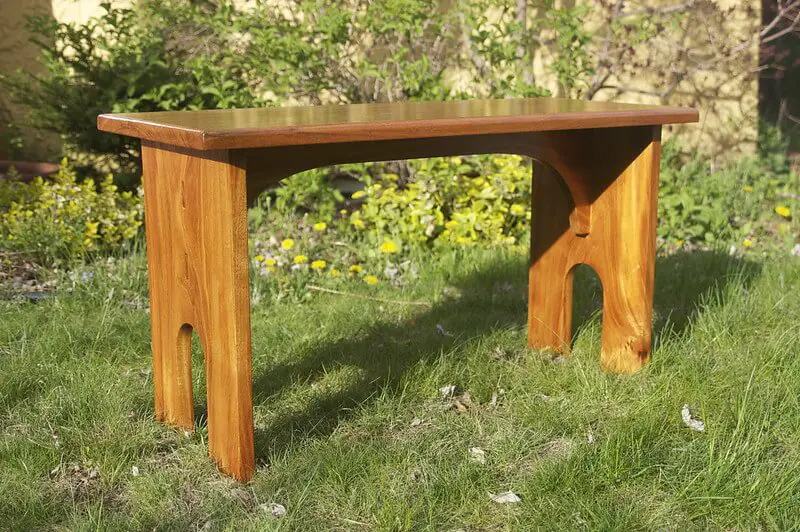It would help to consider various factors when choosing wood for an outdoor bench. The first and most important factor is the climatic conditions in your area. An outdoor bench is subject to natural elements such as wind, heat, and rain. Selecting a wood type that can withstand these elements is crucial.
The second factor is the surface on which you plan to place the bench. Will the bench sit on a hard surface such as a patio, or will it sit on a soft grassy area? If placing it on a grassy area, you’ll need to select wood resistant to rot.
The third and last factor is location. Will the bench be wholly exposed, or will you have some overhead protection for it? If the bench is completely exposed, you may want to go with wood that can withstand direct exposure to sunlight.
Below are the five best kinds of wood for outdoor benches. Read on to discover which one best suit your needs.
Read Next
- How to Choose Wood for Outdoor Furniture (Weatherproofing Tips)
- Best Woods for Outdoor Fence and Garden Projects
- How Long Pressure-Treated Wood Actually Lasts Outdoors
- Best Outdoor Oil Finishes for Longevity and Protection
- How to Repair Cracked or Damaged Wooden Benches
- Selecting the Right Lumber for Shelving and Benches
5 Best Wood Types for Outdoor Benches
Teak
| Characteristics | Score |
|---|---|
| Durability | Excellent |
| Aesthetics | Extremely beautiful |
| Weather-resistance | excellent |
| Resistance to insect infestation. | Excellent |
| Maintenance requirements | Minimal |
When it comes to outdoor furniture, teak steals the show. Here are five reasons why it is the best wood for making an outdoor bench
Teak is the strongest and most durable hardwood. Pieces made from this wood can last for hundreds of years.
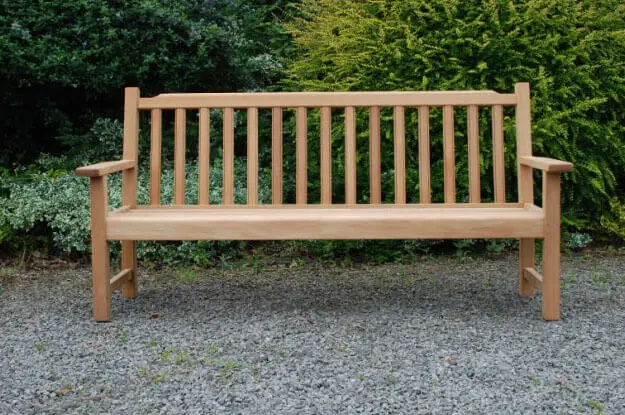
It has a light golden color. When left unfinished, it weathers into a beautiful patina grey.
Teak can withstand all types of weather. It contains natural oils that are water-resistant. They protect the wood from warping, cracking, or becoming brittle.
The natural resins in teak repel insects such as termites and borers. Furniture made from teak can do just fine without paint or varnish. The quality of this wood comes at a price; it’s the most expensive compared to the four kinds of wood discussed in this article.
Acacia
| Characteristics | Score |
|---|---|
| Durability | Good |
| Aesthetics | beautiful |
| Weather-resistance | Good |
| Resistance to insect infestation. | Excellent |
| Maintenance requirements | High |
Acacia is a very dense and durable hardwood. It has a beautiful mellow glow and a unique grain pattern.
Acacia’s weather resistance is slightly good but cannot compare to that of teak. It tends to absorb moisture which causes it to swell or crack. It contains natural oils, which make it resistant to insect attacks.
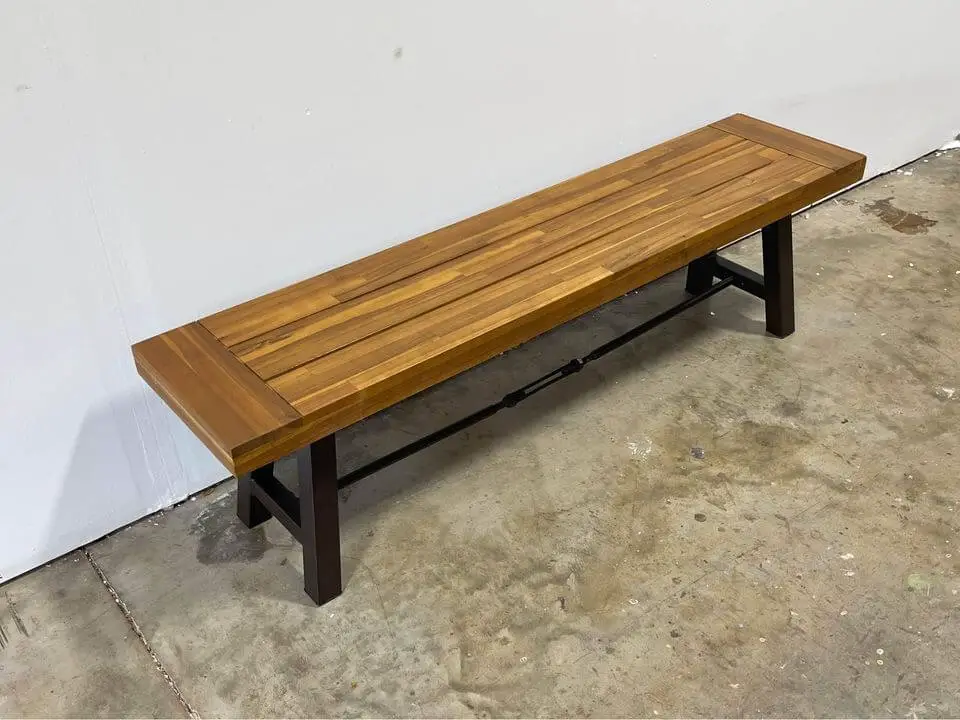
Acacia tends to fade and crack when exposed to direct sunlight. It also swells or cracks due to moisture absorption. It requires weatherproofing to protect it from these elements.
Acacia is very affordable compared to teak and other exotic woods.
Cypress
| Characteristics | Score |
|---|---|
| Durability | Good |
| Aesthetics | beautiful |
| Weather-resistance | Good |
| Resistance to insect infestation. | Excellent |
| Maintenance requirements | Minimal |
The durability of this wood is better compared to that of other softwoods such as cedar. It has an attractive light color, and it finishes very well.
Cypress can withstand outdoor weather without any problem. It contains a preservative known as cypressene that protects it from decay and insect attack.
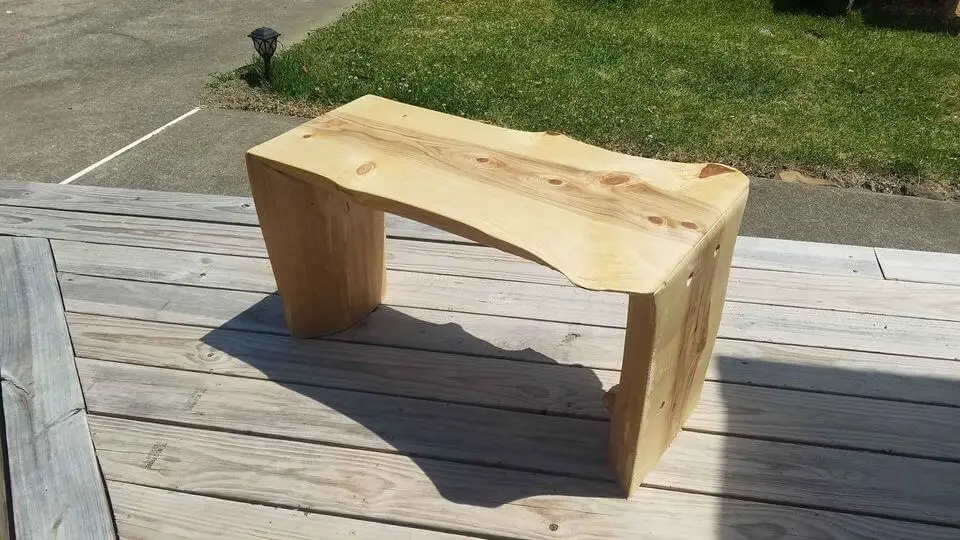
Cypress weathers to a gray color when left unfinished. It requires finishing to maintain its natural color. Old cypress is costly since it’s considered more durable than other softwoods such as cedar.
Cedar
| Characteristics | Score |
|---|---|
| Durability | Good |
| Aesthetics | beautiful |
| Weather-resistance | excellent |
| Resistance to insect infestation. | Excellent |
| Maintenance requirements | Minimal |
Cedar is durable compared to most softwoods. It’s beautifully colored and has dense fibers. When left unfinished, cedar weathers to a lovely gray shade.
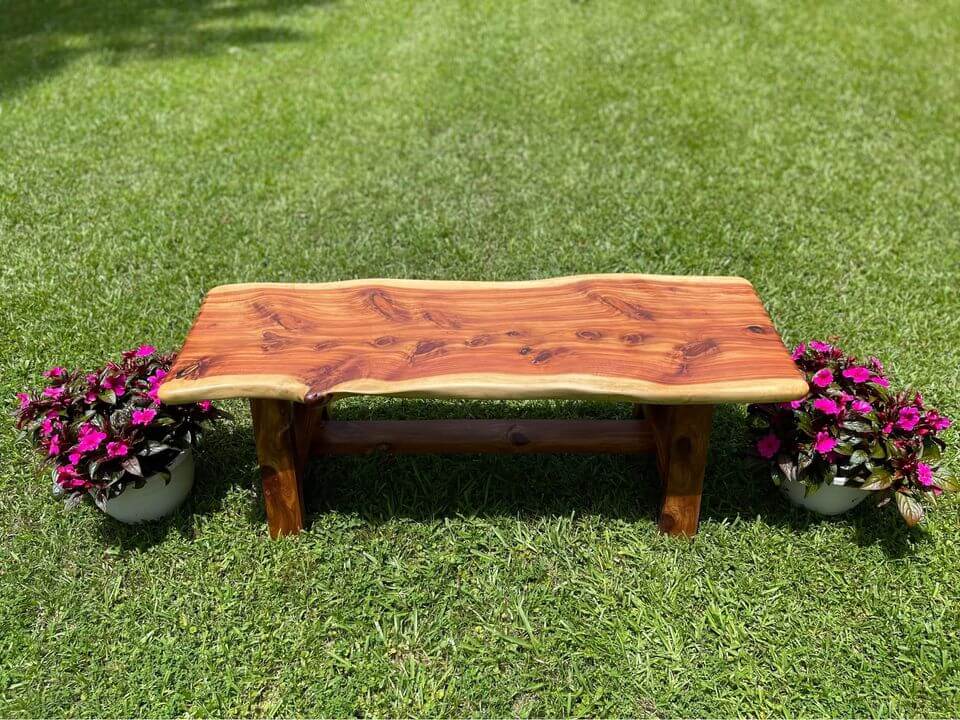
Cedar is very resistant to outdoor elements. It has a distinctive fragrance that keeps insects at bay.
Cedar wood types have very minimal maintenance requirements. You can leave it unfinished, and your furniture will be just okay. But you can finish your pieces if you want the wood to retain its natural color.
Mahogany
| Characteristics | Score |
|---|---|
| Durability | Good |
| Aesthetics | Beautiful |
| Weather-resistance | Fair |
| Resistance to insect infestation. | Good |
| Maintenance requirements | High |
Mahogany is reddish-brown hardwood. It has straight interlocked grains that look beautiful when polished. With proper care, furniture made of mahogany can last for up to 40 years
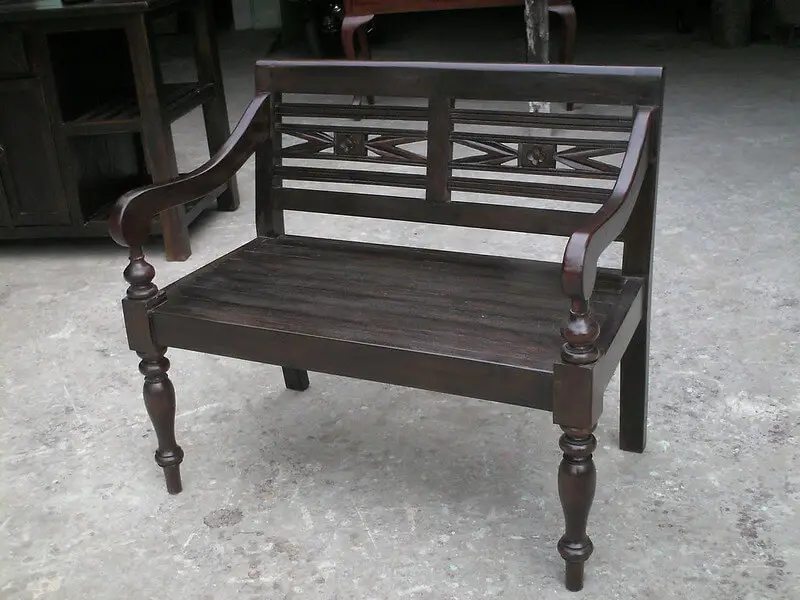
Mahogany is very stable and doesn’t warp or crack when there’s a change in humidity. However, it tends to darken when exposed to direct sunlight.
Like teak and acacia, mahogany is resistant to insect infestation. Unfortunately, it doesn’t work well under direct sunlight. It must be placed under a shade to prevent discoloration.
Protecting Your Outdoor Furniture
Outdoor furniture is a significant investment and should be adequately maintained. Here are a few tips that can extend the lifespan of your outdoor bench.
- Cedar is naturally beautiful, even without paint or stain. However, staining or painting a cedar bench can enhance its appearance and prolong its lifespan. When left untreated, cedar gradually weathers into a gray color. To prevent this fading, you should seal the wood using a sealer that contains UV-protectant chemicals.
- Mahogany darkens when exposed to direct sunlight for long. You can protect your bench by finishing it using UV-inhibiting oils.
- Like cedar, acacia gradually weathers to gray color when left untreated. To prevent this, you can oil your bench using linseed or Tung oil twice a year. Alternatively, you can wax the bench once a year.
Conclusion
An outdoor bench is usually exposed to all sorts of outdoor elements. The type of wood you choose should have the ability to withstand all those elements.
The top five kinds of wood that withstand outdoor weather are teak, cedar, cypress, mahogany, and acacia. These woods are not only beautiful, but they are durable too. These woods can serve their purpose without needing any treatment. However, finishing your outdoor bench will enhance its appearance and prolong its lifespan.
